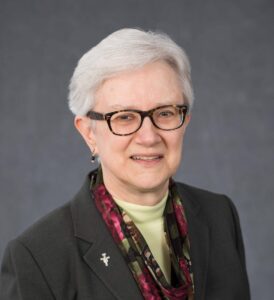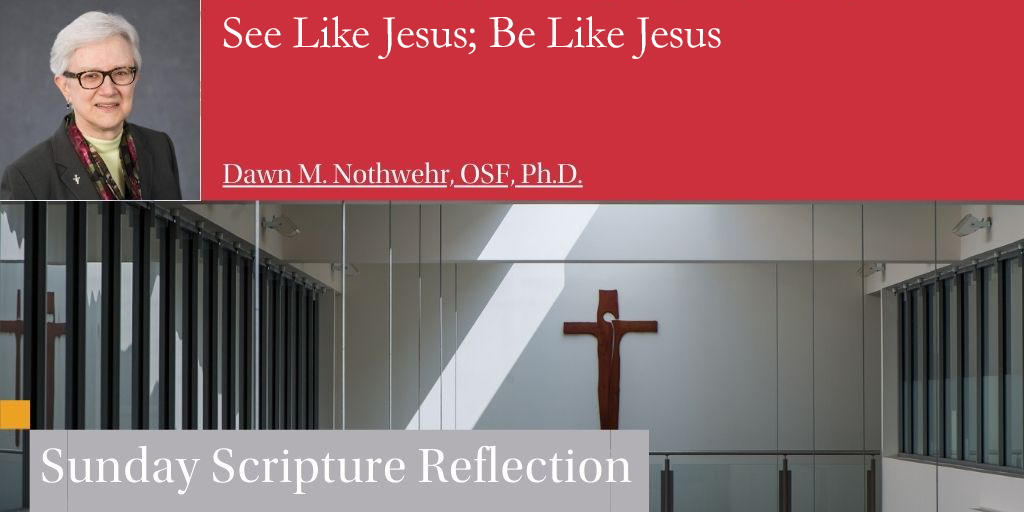
Readings:
1 Kgs 17:10-16
Ps 146:7, 8-9, 9-10
Heb 9:24-28
Mk 12:38-44 or 12:41-44
November 5, 2024, the US experienced perhaps the most viscerally contested national election in its history. Possibly even today, the wounds from often vitriolic exchanges, even among friends, painfully resound in our hearts. In view of this – how can we live into the future to heal the wounds of our nation and act constructively for the common good of all?
Today the Church presents us with two exemplary women; each from different times and places: In the first reading (1 Kings 17:10-16), the widow at Zarephath; In the Gospel, a woman with two small coins, worth only 1/64th of a daily wage! While each woman is exemplary, here I attend to the widow in context of Jesus’ teaching.
In Mk.12:38-40, Jesus denounces scribes who are all about their own prestige and wealth. By contrast, he praises the widow who gives her last coins. Discipleship involves absolute surrender to and trust in the God, to whose will and purpose Jesus was about to commit himself absolutely in his passion. How can Jesus’ attention to this widow help heal and reconcile the peoples of the U.S. at this post–election time?
Much of the rhetoric and actions during the election cycle promoted a harmfully narrow and self-centered focus for this nation’s future. Frequently candidates sought our vote, based on a singularly personal economic measure of wealth and power, rather than the common good of all – the good Jesus challenges forth in today’s Gospel ?
Certainly, Jesus life, ministry, death and resurrection call us, not only to sacrificial giving, but to far more! Jesus evokes our sacrificial living! Certainly sacrificial giving is a valued good. However, we need to examine the realities that define – who and what is ultimately sacrificed.
If we look closely at the Gospel, we can see that giving like the widow, also means contributing to a systemic problem namely: the poor (often necessarily) give everything they have for the sake of the rich. This Jesus condemns:
Beware of the scribes, who like to go around in long robes and accept greetings in the marketplaces, seats of honor in synagogues, and places of honor at banquets. They devour the houses of widows and, as a pretext recite lengthy prayers. They will receive a very severe condemnation. Mk. 12: 38-40
Jesus never intended for the rich to get richer on the backs of the poor. Jesus points out the widow as an example of what he was just been talking about. Considering that interpretation, explains why Mark joins these two paragraphs together here. One illustrates the other. Indeed, here Jesus shows us that both sides of the equation are wrong. Jesus came to heal this breach. Jesus came to usher in a whole new system, a whole new way of living together as children of God.
What if we look at the function of the coins in the scenario? The coins are the means to an end. The coins are also a gift given to God. They are part of the human agency that enacts God’s intention of the salvation of the world. We might compare the coins to our faith – great or small. In what ways can you and I personally invest in accomplishing God’s mission of healing and restoration of justice and peace in a conflicted US? We gain insight in praying the Preface for Thanksgiving Day:
It is truly right and just, our duty and our salvation, always and everywhere to give you thanks, Lord, holy Father, almighty and eternal God, through Christ our Lord.
You have entrusted to us the great gift of freedom, a gift that calls forth responsibility and commitment to the truth that all have a fundamental dignity before you. In Jesus, through his death and resurrection, we find our ultimate redemption, freedom from sin, and every blessing.
As so, with hearts full of love, we join the angels, today and every day of our lives, to sing your glory . . . . (https://www.catholicculture.org/commentary/prayers-thanksgiving-for-thanksgiving-day/)
What if each of us saw her or his part in this story, as the gifts each has personally received? Where can each invest oneself? How can you contribute to God’s purpose and mission? We may not think those coins amount to much. Sometimes our faith doesn’t amount to much, either. But if it’s all we have to live on, how can we make sure we don’t squander that gift?
Perhaps most significantly, Jesus sees the widow! He acknowledges her person, her being, her plight, and her offering. She is not, just an object lesson, but a person. She is easily unseen, even invisible, yet worthy of Jesus’ attention, and ours. She is not just “a less fortunate one!” Why should we assume her poverty is the end product of “luck?” Wealth, poverty, and gross inequality result from social, political, and economic policies and practices.[i]
Along with all U.S. elected officials, we citizen believers must “see the widow” and ensure she and all in need, are cared for, as God cares for us. Ultimately, we must step in and take our place next to the scribes, the wealthy, and the widow with her two little coins. We can’t do anything to change the broken systems that rule us until we see that they are, indeed, broken. We can’t see Jesus until we see the widow, and recognize her as one of us instead of as someone or something that is apart from us. If we want to be like Jesus, we have to see like Jesus.
[i] Christine Firer Hinze, Radical Sufficiency: Work, Livelihood, and a US Catholic Economic Ethic (Washington: Georgetown University Press, 2021). Also, Kate Ward, Wealth, Virtue, and Moral Luck: Christian Ethics in an Age of Inequality (Washington: Georgetown University Press, 2021).
